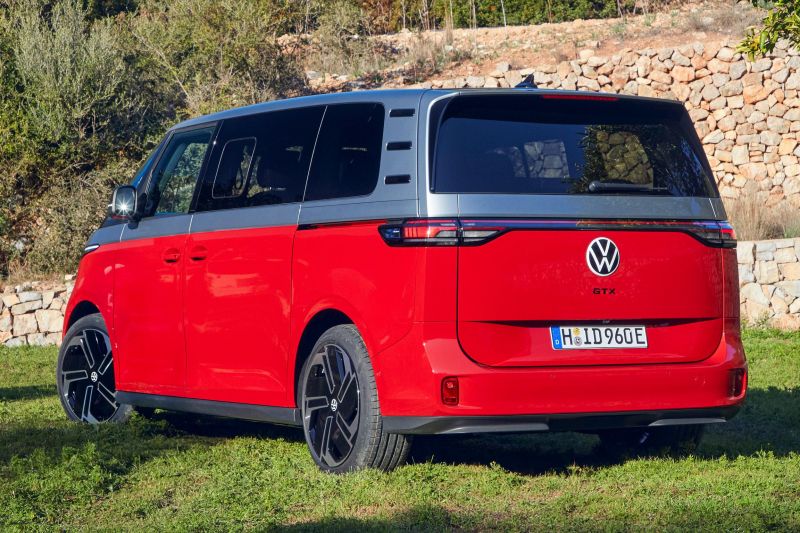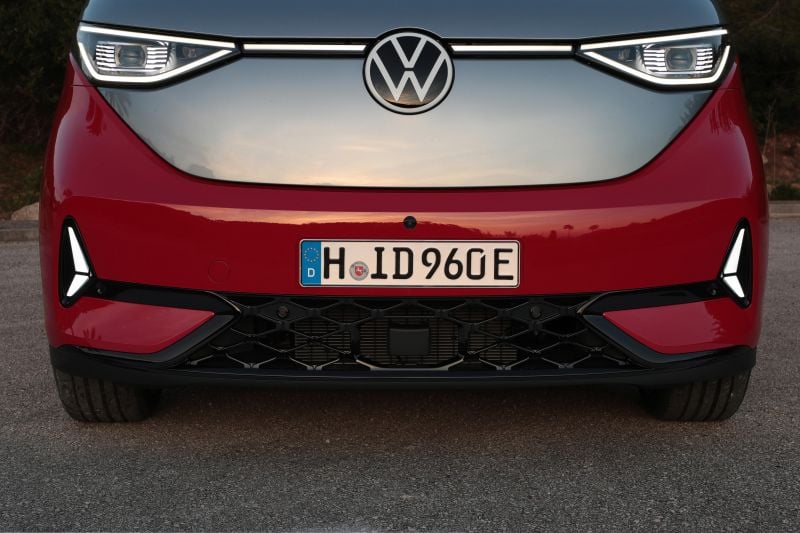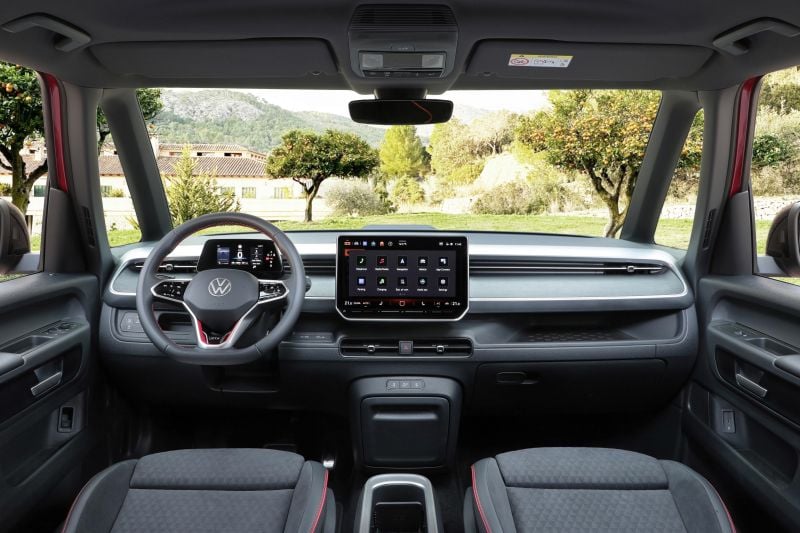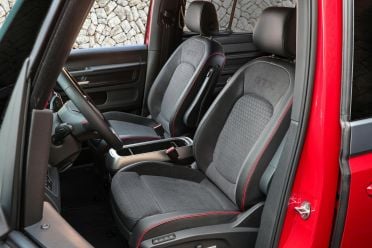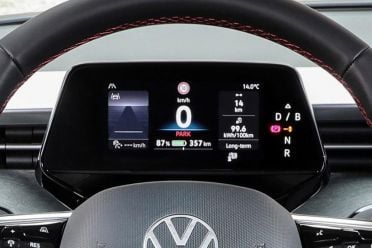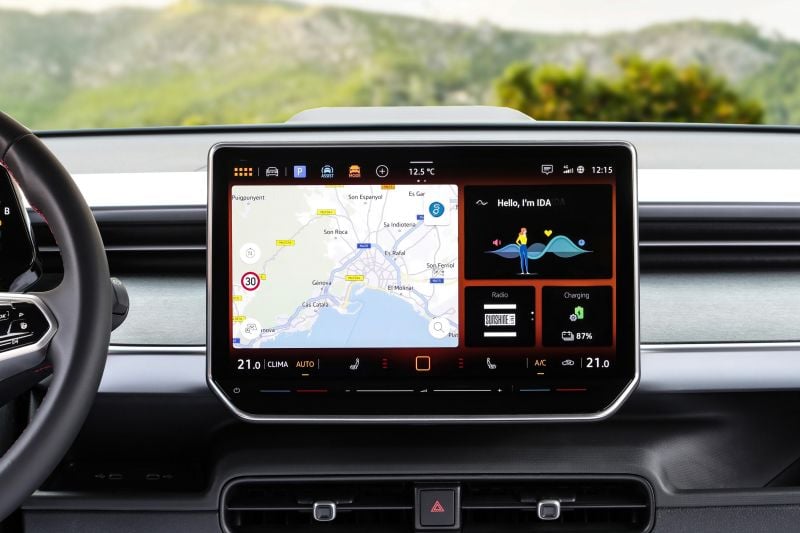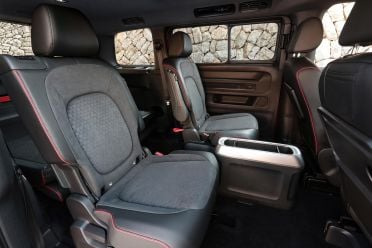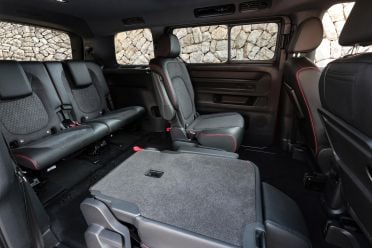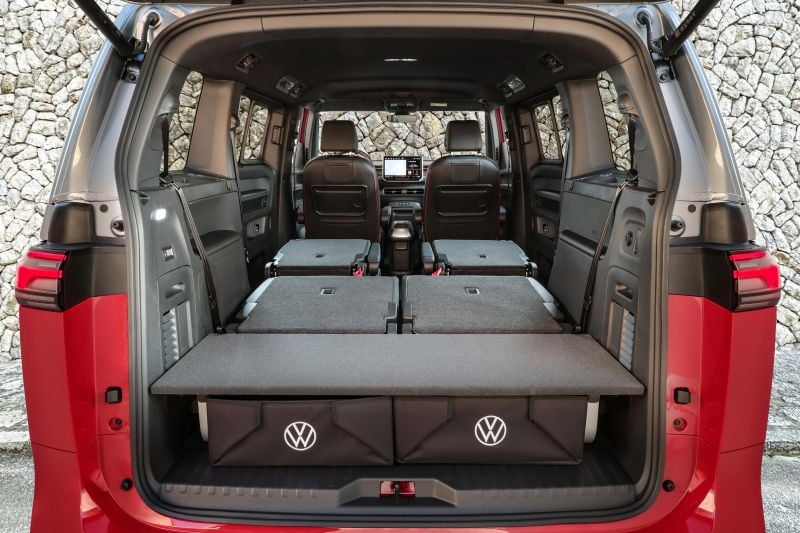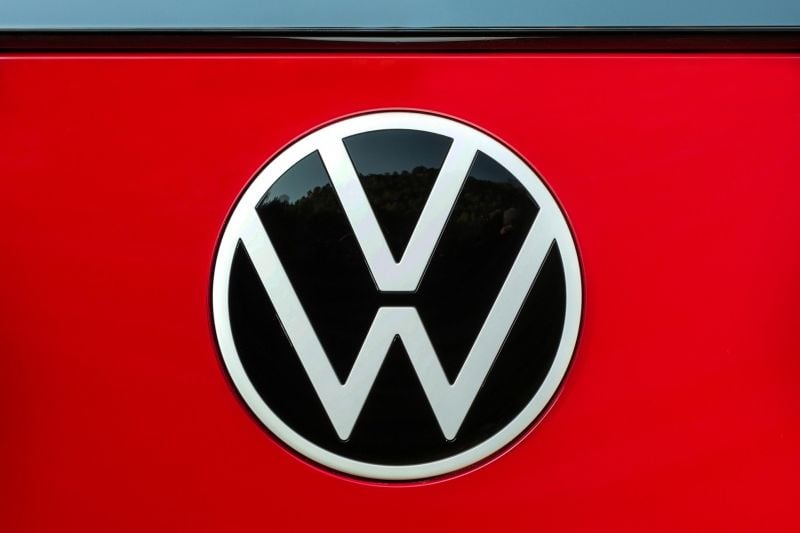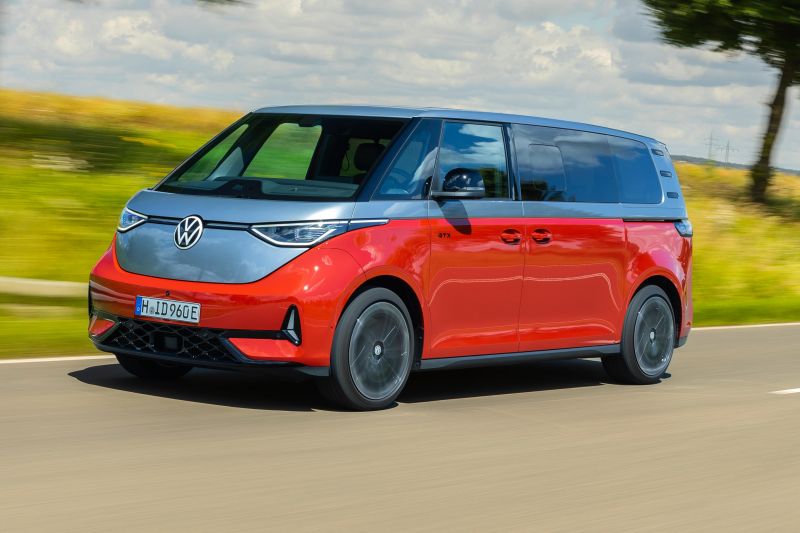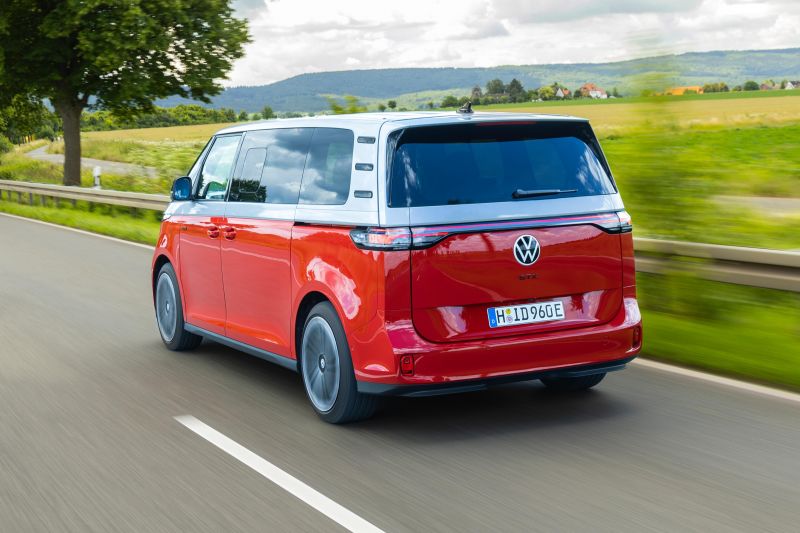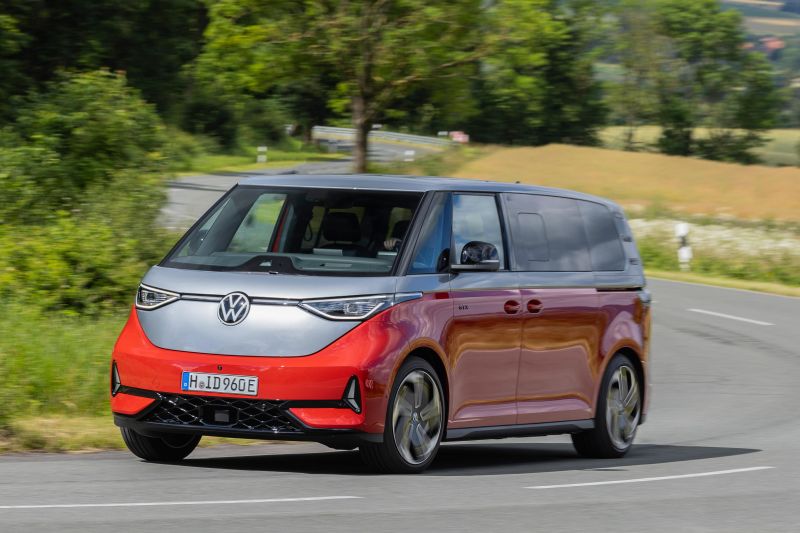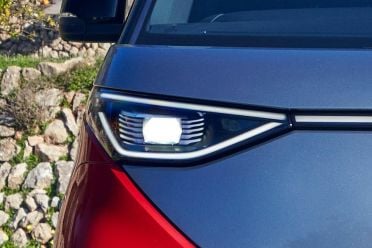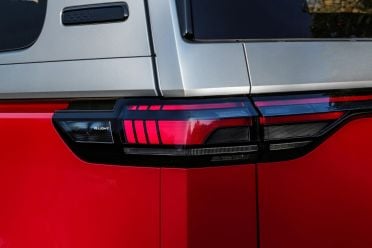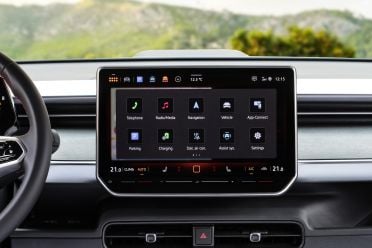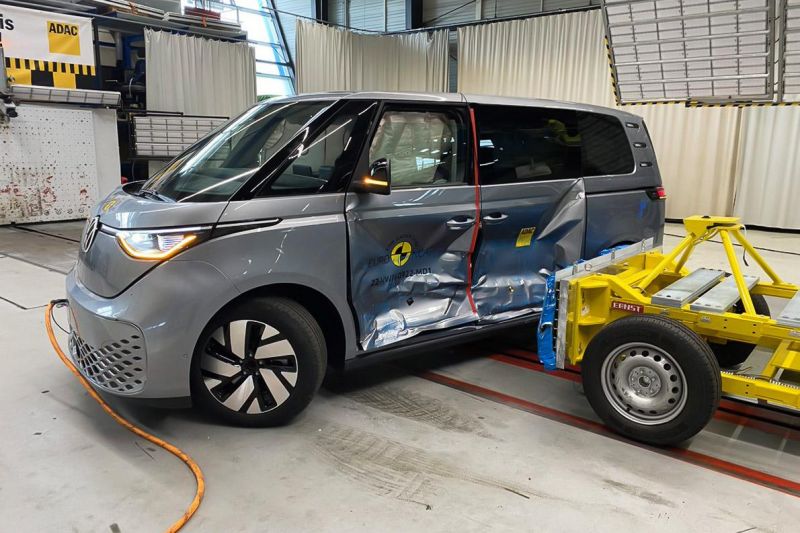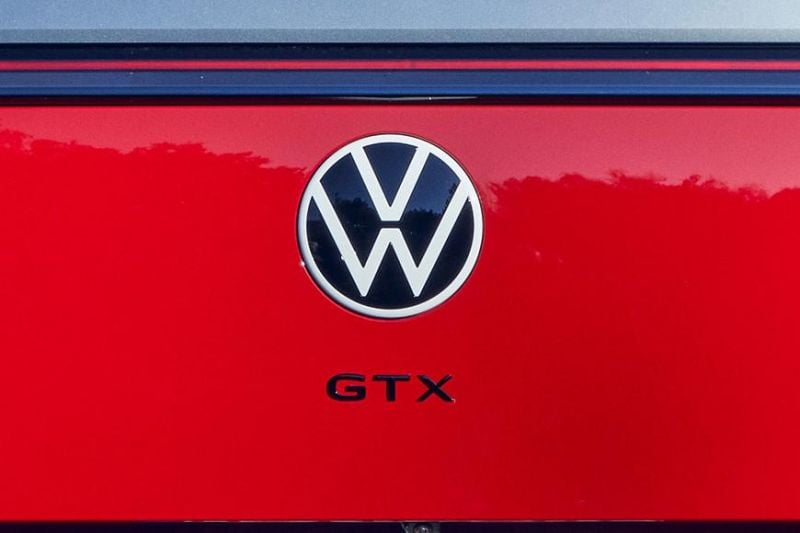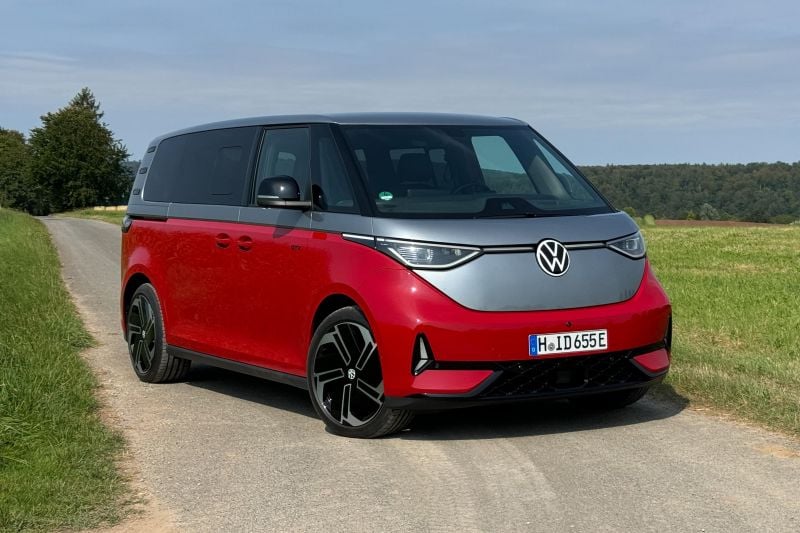The Volkswagen ID. Buzz GTX is a sportier looking and sportier driving take on the ‘electric Kombi’ theme. Did the world need that?
Arguably not. If Volkswagen had just made a dual-motor model that didn’t cost almost $20,000 more in Australia, it would have been a sweeter deal for buyers.
But there’s no denying this is still a lot of electric vehicle (EV) for the money – in this review, you’ll find out why.

How much does the Volkswagen ID. Buzz cost?
Australian pricing for the VW ID. Buzz GTX has been announced and it’s a damn sight cheaper than electric van rivals like the LDV Mifa 9, Mercedes-Benz EQV and seven-seat SUVs like the Kia EV9.
| Model | Price before on-road costs |
|---|---|
| 2025 Volkswagen ID. Buzz Pro SWB BEV560 RWD | $87,990 |
| 2025 Volkswagen ID. Buzz Pro LWB BEV560 RWD | $91,290 |
| 2025 Volkswagen ID. Buzz GTX LWB BEV 4Motion AWD | $109,990 |
To see how the Volkswagen ID. Buzz stacks up against its rivals, use our comparison tool.
What is the Volkswagen ID. Buzz like on the inside?
The price tag is the big thing to remember here. Does it feel like $110,000? In some ways, no.
I say that because there are some hard plastic finishes around the cabin that you invariably don’t find in cars with this kind of price. That’s because this is essentially a commercial van turned into a family wagon and then a performance-oriented variant.
There are some elements, however, that do feel upmarket. The seats are finished in ArtVelours microfleece trim and have a pretty triangulated pattern, and there are GTX logos embroidered into the backrests. They are very comfy, offer good adjustability and incorporate fold-down armrests. Great for when you’re charging!
Around the cabin there’s an abundance of red trim, including on the steering wheel and the seats.
The interior also has all the clever storage features of the standard ID. Buzz, including multi-tier storage pockets in the doors, a removable centre console box between the front seats (with ice scraper and bottle opener) and a shelf in front of the passenger. The centre area below the screen has a flip-down set of cupholders as well.
In front of the driver there’s a convenience wireless phone charging slot and there’s a plethora of USB-C charge ports in this car – in the doors (including the rear sliding doors), in all three rows and on the dash.
The biggest party trick of the cabin is the massive glass roof, which features a slider to keep it transparent or turn it opaque in the blink of an eye. It negates the need for a big shield or cover.
There’s another neat part of the cabin, namely the 12.9-inch touchscreen. It includes wireless Apple CarPlay and Android Auto, satellite navigation and plenty of features including a ChatGPT-based voice control system.
The screen itself has much better software than some other recent VWs and there’s a favourites bar at the top that allows you to jump into submenus like the autonomous parking system, driving assistance settings, drive mode and a number of other controls.
But annoyingly, the ID. Buzz GTX still has those frustrating haptic controls on the steering wheel, which can be easy to bump by accident. There are also touch-sensitive sliders for the climate control and volume, but thankfully there’s an ‘always on’ temperature menu at the bottom of the display.
In the front (below the screen) and the back (on the B-pillar) there are buttons to electronically open or close the side sliding doors, and there are slide-opening windows too.
Rear occupants have access to heaps of storage; the door pockets and seatback pockets should prove handy to hide crumbs and melted chocolate, but there are also handy amenities like ceiling-mounted air vents and a climate control system for the back seats.
The GTX vehicle I drove had a six-seat layout, but it’s not clear if this will be offered in Australia. In this guise, it has captain’s buckets in the second row and a further two seats behind them.
There are also ISOFIX and top-tether anchors for all four positions in the six-seater, while the seven-seat LWB Pro I tested had a top-tether point only for the middle position in the second row.
Someone my size (182cm) can fit behind their own driving position with room in front. In fact, three six-footers can fit in all three rows with space to spare.
If you need to get into the third row, there’s a broad opening thanks to smart slide-and-tilt seats in the middle row.
Back-seat bandits have their own lights, vents, grab handles, cupholders, storage, charging outlets, padded armrests, and a good view out thanks to the ample squared-off glass.
Boot space is dependent on the seating configuration. VW claims 306 litres of cargo capacity with all three rows in use, increasing to more than 1000L with the back row folded down. There’s no spare wheel but you do get a tyre repair kit.
Also, despite looking like it could fit a western suburbs rugby team with space to spare, the ID. Buzz’s payload capacity might require a few trips instead of just one. The six-seat GTX has a payload figure of just 507kg, reducing to just 481kg for the seven-seat version, according to European specifications.
What’s under the bonnet?
This is the most powerful take on the Kombi ever and, aside from that, it’s a pretty punchy member of the VW range. The ID. Buzz GTX has more grunt than a Golf R and it’s only bettered for brute power in the line-up by the Touareg R plug-in hybrid.
| Specifications | Volkswagen ID. Buzz GTX |
|---|---|
| Drivetrain | Dual-motor electric |
| Battery | 86kWh (usable) lithium-ion |
| Power | 250kW |
| Torque | 679Nm |
| Driven wheels | All-wheel drive |
| 0-100km/h (claimed) | 6.4 seconds |
| Power consumption (claimed) | 21.1kWh/100km (EU-spec WLTP) |
| Power consumption (as tested) | 21.9kWh/100km |
| Claimed range | TBC |
| Max AC charge rate | 11kW |
| Max DC charge rate | 200kW |
To see how the Volkswagen ID. Buzz stacks up against its rivals, use our comparison tool.
How does the Volkswagen ID. Buzz drive?
Over several hundred kilometres of mixed driving, including autobahns, back roads, city streets and similar stuff to what you’ll find on your daily drive in Australia, I’d say the ID. Buzz GTX is mostly agreeable.
The version we tested rode on 21-inch wheels with low-profile tyres and, while this is the sportiest version of the Buzz, there’s no adaptive suspension. This means you can’t soften the ride quality if you wish and it’s a touch firmer than some will appreciate.
Remember, this is a massive vehicle with a huge battery and big rims, so there’s an element of ‘that’s just physics’ at play here. However, I was left wanting a bit more comfort, even on the mostly smooth roads we sampled, where it still felt a bit too fidgety.
If you’re buying the GTX variant – which is billed as the performance grade of the ID. Buzz range – you might be okay with that. I just found that, in direct comparison to the Pro RWD variant, the GTX felt a bit less delightful in mixed scenarios.
There’s no denying it has some serious snot, though. Like a toddler at daycare, in fact. It powers out of corners with more pace than you’d expect a circa-3000kg family car has any right to.
Yep, it is very quick. Don’t go expecting it to be as rapid as a Tesla Model Y Performance or anything like that. It’s not mindblowingly fast, but it is fast for what it is.
As with most dual-motor all-wheel drive models, there’s a compromise with handling that comes from having the front axle having to get power down and also direct proceedings.
The steering also has a bit of an artificial heaviness to make it feel more sporty, but it doesn’t translate to that effect.
You get more road noise from the tyres with the large 21-inch rims too. The other thing that weighs against the ‘sporty’ positioning are the brakes.
Yes, it does stop, but you need to make sure you prepare yourself for corners and traffic lights, where the GTX needs plenty of distance to pull up gracefully, because it really does feel its weight under pressure.
Of course it has regenerative braking and that system works well in stop-start driving. You can also flick the transmission into ‘B’ mode, and it’ll almost come to complete stop.
Honestly, the GTX is going to appeal to a lot of Volkswagen customers who just want the ‘best’ one and, in theory, this is the best one you can get if you need all-wheel drive.
But if you don’t, the better one to get might be the rear-wheel drive version. You’ll also save a wad of cash.
What do you get?
Local specifications for the flagship ID. Buzz GTX are yet to be confirmed. See below a list of expected standard equipment.
Volkswagen ID. Buzz GTX highlights:
- Seven seats
- IQ. Light matrix LED headlights
- Tyre pressure monitoring
- Power tailgate
- Rain-sensing wipers
- Heated washer nozzles
- Rear wiper
- Power sliding doors
- Power-folding, heated exterior mirrors
- Distinct front bumper design with honeycomb finish
- Distinct daytime running lights
- Black exterior trim highlights
- 20- or 21-inch wheels
- GTX badging
- Panoramic glass roof with one-touch opaque adjustment
- Dark interior trim
- Black headliner
- Red contrast piping and stitching
- Heated steering wheel
- Leather-wrapped steering wheel
- ArtVelours Eco microfleece trim with diamond pattern
- Electric front seat adjustment with memory settings
- Manual front seat height adjustment
- Heated front seats
- Removable centre console with multiple storage compartments
- Stainless steel pedals
- Nine-speaker sound system
- 12.9-inch touchscreen infotainment system
- Wireless Apple CarPlay and Android Auto
- IDA voice assistant
- DAB+ digital radio
- Wireless phone charger
Is the Volkswagen ID. Buzz safe?
The standard ID. Buzz grades have been awarded a five-star safety rating from Euro NCAP based on testing conducted in 2022, but Australian sister authority ANCAP is yet to apply a rating locally.
| Category | Volkswagen ID. Buzz |
|---|---|
| Adult occupant protection | 92 per cent |
| Child occupant protection | 87 per cent |
| Vulnerable road user protection | 60 per cent |
| Safety assist | 90 per cent |
Standard safety equipment includes:
- Autonomous emergency braking
- Pedestrian detection
- Cyclist detection
- Swerve support
- Oncoming vehicle braking when turning
- Blind-spot monitoring
- Driver attention monitoring
- Lane-keep assist
- Rear cross-traffic alert
- Safe exit warning
- Surround-view camera
- Travel Assist
- Lane centring
- Adaptive cruise control with stop/go
- Front and rear parking sensors
- Front, front-side, front-centre and curtain airbags
There are top-tether anchor points for child seats in all three positions in the second row, plus ISOFIX points for the two outboard seats. In LWB models, the third row also features ISOFIX points and top-tethers, making it possible to fit five child seats.
How much does the Volkswagen ID. Buzz cost to run?
Volkswagen Australia offers a five-year, unlimited-kilometre warranty for its entire line-up.
It will also offer an eight-year warranty for its high-voltage battery pack, which is in line with the majority of EV offerings.
Nitty-gritty details like servicing costs and intervals are still to be locked in, but you can expect the German brand to offer a mix of pay-as-you-go capped-price servicing options, as well as the choice of a prepaid care plan, possibly for up to 10 years of maintenance cover.
To see how the Volkswagen ID. Buzz stacks up against its rivals, use our comparison tool.
CarExpert’s Take on the Volkswagen ID. Buzz GTX
If you don’t need or want all-wheel drive, my advice would be to check out the standard LWB Pro instead, because it’s a bit more fun, doesn’t feel as heavy and remains more faithful to the original idea of the ID. Buzz.
But there is no denying that for those who do want or need AWD in an electric family bus like this, the GTX is the best on offer in the market. While it’s not a performance people mover, it’s bloody close to it.
Interested in buying a Volkswagen ID. Buzz? Get in touch with one of CarExpert’s trusted dealers here
Click the images for the full gallery





